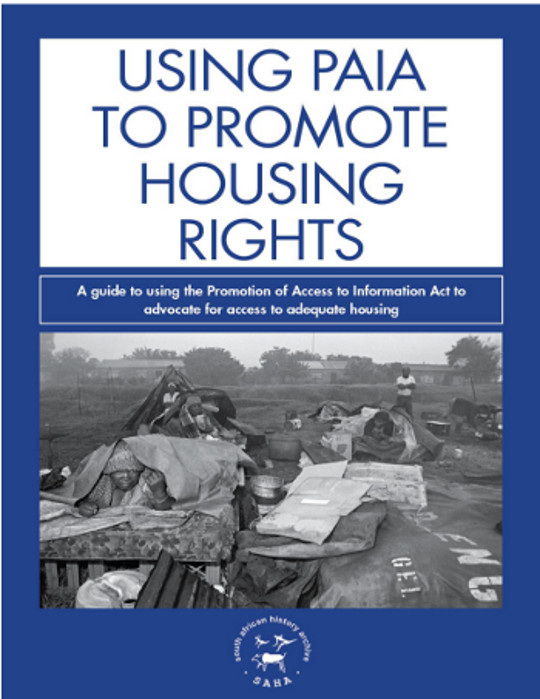SAHA is pleased to announce the release of a new guide entitled “Using PAIA to Promote Housing Rights" that has been developed to raise awareness about the right to housing and to assist in accessing information about housing issues under the Promotion of Access to Information Act, 2000 (PAIA).

As previously reported, over the last nine months SAHA has been working with over 15 different non government organisations and community based organisations across South Africa to build capacity to understand and utilise PAIA as a strategic advocacy tool. As emphasised throughout the three workshops with those organisations, PAIA is a key tool that can be used to address housing issues faced by individuals and communities, and to advocate for the right to have access to adequate housing.
The right to have access to adequate housing, along with other rights set out in the Constitution of the Republic of South Africa, protects South Africans from some of the worst features of the apartheid era including relocation, forced removals and arbitrary searches of homes. The Constitution also more positively provides for a range of other rights including giving South Africans a right to access to water and the right to live in an environment that is not harmful to health or well being.
Despite the recognition of those rights, the ability to have those rights enforced and respected remains a serious problem for many South Africans. This remains the case in spite of significant projects and funding, firstly under the Reconstruction and Development Programme (RDP) of 1994, and more recently the R50.5 billion low income housing and upgrading of informal settlements promised by government in 2012.
Housing advocates, and all those seeking to address their housing issues, are working to make those strong Constitutional guarantees a living reality, and not just a legal argument.
One of the current challenges is to hold government and private sector contractors accountable for delivering long promised houses. Community leaders are also making sure there is informed community participation as informal settlements are upgraded, so that the plans meet the needs of the community as they grow and change during the planning and building process.
The need for communities to use the right of access to information to address housing issues resulted in SAHA’s training and support to make appropriately targeted PAIA requests. This has already produced a range of PAIA requests that have resulted in the release of records now archived in SAHA Collection AL2878: The Freedom of Information Programme Collection that have already begun to inform advocacy and bring resolution to long standing issues.
SAHA’s final support tool for communities addressing housing issues is the new written guide that provides practical advice on making a PAIA request, and examples of how PAIA can be used to address housing issues and to advocate for the right to have access to adequate housing. The 30 page publication titled Using PAIA to Promote Housing Rights has been distributed to almost all participants in the recent training and workshop programme.
The Guide is now available to be downloaded, free of charge from the SAHA website any time, by anyone interested in using PAIA to inform exercising and defending the right to access to adequate housing.
SAHA thanks the Open Society Foundation for South Africa for their generous support in the development of the Guide.





